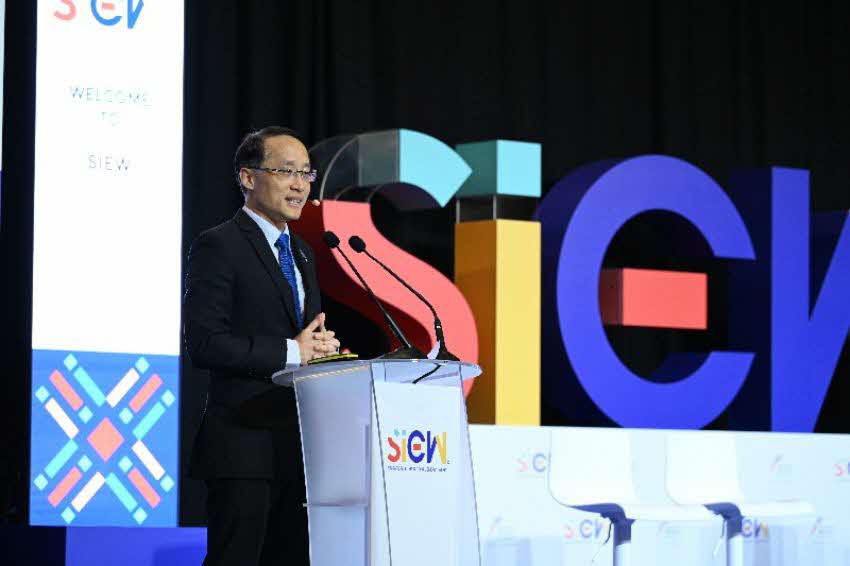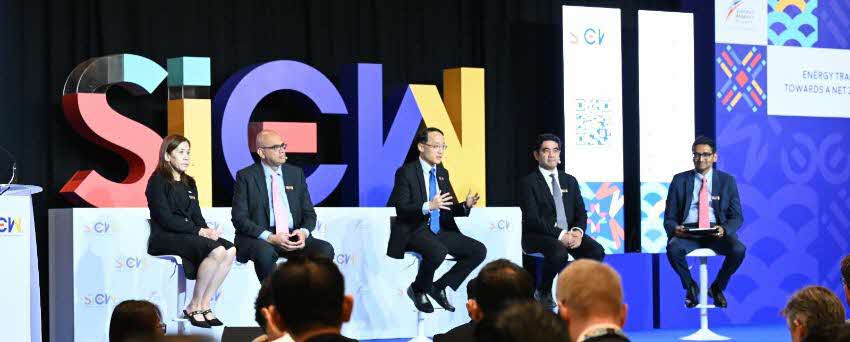Fostering regional connectivity could be the strategic linchpin to promoting economic growth, sustainable development, and energy security.

Global leaders from both the public and private sectors recently converged to deliberate on the myriad opportunities and strategic significance of regional connectivity. This can play a pivotal role in advancing renewable energy technologies and facilitating cross-border power trading.
Ngiam Shih Chun, Chief Executive, Energy Market Authority (EMA), commenced the SIEW Energy Insights sessions with a Welcome Address. Reflecting on the takeaways from Day 1 and Day 2 of SIEW 2023, Mr Ngiam underscored the collective commitment to achieving a net zero future. He affirmed that "everybody is firmly committed to the net zero future, and we have to work together to get there".
He emphasised that the focus has shifted from what needs to be done to achieve a net zero future to how we can prepare for the energy transition. This preparation includes considerations of technological advancements, policy adjustments, and strategic planning.

Enhancing regional connectivity
Following Mr Ngiam's welcome address, Anish De, Global Head of Energy, Natural Resources and Chemicals, KPMG in India, initiated a panel discussion that delved into the significance of regional connectivity.
Mr Ngiam reiterated his strong belief in regional connectivity and its role in bolstering energy security across the region. He stressed how regional connectivity fosters mutual support, enabling countries to share reserves and, in turn, reduce the strain on individual power systems. Moreover, he highlighted the catalytic effect that regional connectivity has in driving the development of renewables across the region.
Echoing these sentiments, Tuan Mohammed Rashdan bin Mohd Yusof, Chairman, Energy Commission (Malaysia), shared from a Malaysian perspective that regional connectivity not only enhances accessibility but also aids in contributing to a more cost-effective, stable, and efficient power system.
Discussing the roles of multilateral organisations, Rajat Misra, Director General, Infrastructure Investment Department (Region 1), Asian Infrastructure Investment Bank, noted their vital contribution to the decarbonisation process.
Key learnings from the LTMS-PIP
When asked about the insights derived from the Lao PDR-Thailand-Malaysia-Singapore Power Integration Project (LTMS-PIP) a year on, Mr Ngiam shared that the project's success hinged on close collaboration among all partners. This project marked a milestone as it represented the first instance of multiple Asian countries engaging in sustained cross-border power trading. He further stated that the four countries are now actively working to expand power trading capacity and fostering multilateral trading, with the eventual goal of establishing an ASEAN Power Grid.
Drawing inspiration from the European Union's common marketplace, Tuan Rashdan stressed the importance of establishing a common regional energy market that facilitates the free flow of electrons and provides a comprehensive perspective on energy trading.
The role of regulations in accelerating regional connectivity
Mr Ngiam emphasised that for regional connectivity to succeed, "four key ingredients" are needed. These are:
- High-level commitment across governments
- Technology to enhance energy trading efficiency
- Commercially viable processes for sustainability
- The collaborative efforts of multiple stakeholders
Mr Misra added his perspective, highlighting the vast experience that multilaterals bring as facilitators in structuring interconnections more effectively.
Janice Bong, Managing Director, Power & Renewables, Keppel Infrastructure, emphasised the importance of developing supportive frameworks while modernising grids to meet the growing demand for the free flow of electrons.
Mr De asked the panel if there were any potential drawbacks to regional connectivity. In response, Mr Ngiam conveyed his belief in the effectiveness of regional connectivity and his optimism for the future.
The session underscored the importance of regional connectivity in establishing a sustainable, interconnected energy landscape for Southeast Asia, and the collaborative efforts required to make this vision a reality.
Follow us on X (formerly Twitter) and Telegram to get the latest updates.